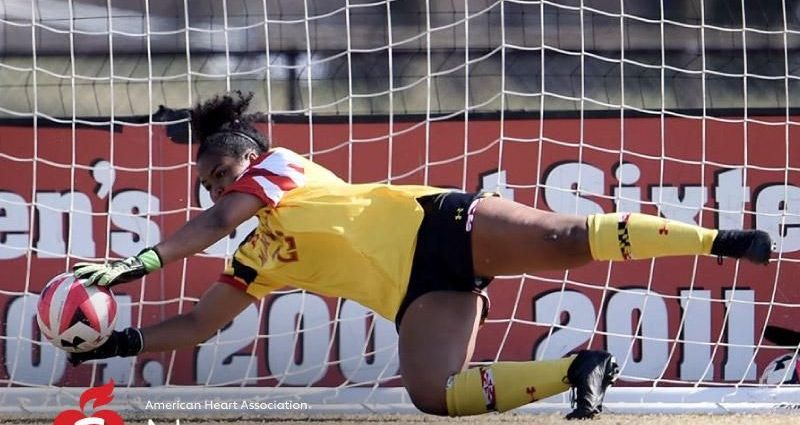WEDNESDAY, Sept. 1, 2021 (American Heart Association News) — Doctors and researchers who helped care for college athletes with COVID-19 and set guidelines for a safe return to play now plan to study the long-term effects of the virus. The work could have a lasting impact beyond the pandemic.
The research stems from trailblazing collaborations between cardiologists and sports medicine physicians across the country who wanted to better understand the impact of the disease on college athletes’ hearts.
Researchers overseeing one project, the Outcomes Registry for Cardiac Conditions in Athletes (ORCCA), plan to collect a new round of data at the start of this school year to follow up with athletes diagnosed with COVID-19 a year ago. The 42 colleges and universities participating in the registry play primarily in some of the country’s biggest athletic conferences.
ORCCA researchers also plan to release a study later this year focusing on athletes with prolonged COVID symptoms, or so-called long-haulers, said Dr. Aaron Baggish, the project’s co-principal investigator and director of the Cardiovascular Performance Program at Massachusetts General Hospital in Boston.
The ORCCA team released initial results in April in the American Heart Association journal Circulation, finding no heart complications related to COVID infection among more than 3,000 college athletes who underwent heart tests, including an MRI for some, between September and December 2020. The study also indicated it was safe for athletes with no or mild symptoms to return to play without cardiac testing.
“Time will tell us if the findings continue to be durable, but so far it looks like it will be, so it’s good news,” Baggish said.
The Big Ten Conference continues to collect data for its own registry. In contrast to the initial ORCCA findings, Big Ten team physicians and cardiologists found evidence on MRI tests of myocarditis, or heart inflammation, in 37 of 1,597 – or 2.3% – of athletes who had COVID-19. They reported the findings in May in JAMA Cardiology.
At the University of Maryland, part of the Big Ten, head team physician Dr. Yvette Rooks said they’re learning a lot from participants.
“There’s been a tremendous amount of information gathering from all the people who contributed to the registries, including the way symptoms occurred, the kinds of symptoms, and protocols for student-athletes to get back to play,” said Rooks, also assistant director of the university’s health center.
Kennedy Tolson, a Maryland goalkeeper, contracted COVID twice in 2020. The first time happened in July that year. Following quarantine, she was back at practice in about a week.
The second time came in November, when the 20-year-old described feeling like she “got hit by a truck.” By that point, the Big Ten had fully instituted return-to-play guidelines, which included a 21-day quarantine and protocols including an electrocardiogram and follow-up visits.
Tolson was back to taking part in two-a-day training sessions during preseason camp in August. She appreciated the precautions that Rooks and the sports medicine team put in place, and the ongoing research to safeguard players.
“If they hadn’t been taking as many steps in terms of getting back to play and to help us start feeling better, I think it could have been detrimental,” Tolson said.
The Big Ten established core labs around the conference to collect and study test results. Maryland houses the epidemiology and MRI core labs.
“We’re not going to know about everything we went through until it’s over and we look at things retrospectively,” Rooks said.
ORCCA researchers are starting to look ahead to what’s next after the pandemic. The registry, done in collaboration with the AHA and American Medical Society for Sports Medicine will pivot to studying young people with inherited heart disease or congenital heart defects, and whether they chose to continue playing a sport after a diagnosis.
Researchers first tried to establish a cardiac registry for college athletes about five years before the pandemic but were unsuccessful. Now that it’s in place, Baggish said the team is proud of the impact their work has had, not just in college athletics but professional sports too.
Most pro leagues have backed off comprehensive testing for all players with COVID-19 regardless of the severity of symptoms, he said. Instead, who gets tested is now science-based, with testing resources concentrated on certain COVID cases, such as players who have moderate to severe illness or who have chest pain or shortness of breath when returning to exercise.
The work “wouldn’t have happened without an amazing collaboration between cardiologists and the sports medicine community,” Baggish said. “This is really the first time that something like this has been pulled off.”
American Heart Association News covers heart and brain health. Not all views expressed in this story reflect the official position of the American Heart Association. Copyright is owned or held by the American Heart Association, Inc., and all rights are reserved. If you have questions or comments about this story, please email editor@heart.org.
By Genaro C. Armas
Copyright © 2025 HealthDay. All rights reserved.

